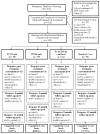Pain coping skills training and lifestyle behavioral weight management in patients with knee osteoarthritis: a randomized controlled study
- PMID: 22503223
- PMCID: PMC3358356
- DOI: 10.1016/j.pain.2012.02.023
Pain coping skills training and lifestyle behavioral weight management in patients with knee osteoarthritis: a randomized controlled study
Abstract
Overweight and obese patients with osteoarthritis (OA) experience more OA pain and disability than patients who are not overweight. This study examined the long-term efficacy of a combined pain coping skills training (PCST) and lifestyle behavioral weight management (BWM) intervention in overweight and obese OA patients. Patients (n=232) were randomized to a 6-month program of: 1) PCST+BWM; 2) PCST-only; 3) BWM-only; or 4) standard care control. Assessments of pain, physical disability (Arthritis Impact Measurement Scales [AIMS] physical disability, stiffness, activity, and gait), psychological disability (AIMS psychological disability, pain catastrophizing, arthritis self-efficacy, weight self-efficacy), and body weight were collected at 4 time points (pretreatment, posttreatment, and 6 months and 12 months after the completion of treatment). Patients randomized to PCST+BWM demonstrated significantly better treatment outcomes (average of all 3 posttreatment values) in terms of pain, physical disability, stiffness, activity, weight self-efficacy, and weight when compared to the other 3 conditions (Ps<0.05). PCST+BWM also did significantly better than at least one of the other conditions (ie, PCST-only, BWM-only, or standard care) in terms of psychological disability, pain catastrophizing, and arthritis self-efficacy. Interventions teaching overweight and obese OA patients pain coping skills and weight management simultaneously may provide the more comprehensive long-term benefits.
Copyright © 2012. Published by Elsevier B.V.
Conflict of interest statement
No conflict of interest is reported by the authors.
Figures



References
-
- Aaboe J, Bliddal H, Messier SP, Alkjaer T, Henriksen M. Effects of an intensive weight loss program on knee joint loading in obese adults with knee osteoarthritis. Osteoarthritis Cartilage. 2011 - PubMed
-
- Anderson JJ, Felson DT. Factors associated with osteoarthritis of the knee in the first national Health and Nutrition Examination Survey (HANES I). Evidence for an association with overweight, race, and physical demands of work. Am J Epidemiol. 1988;128:179–89. - PubMed
-
- Anderson JJ, Felson DT, Meenan RF, Williams HJ. Which traditional measures should be used in rheumatoid arthritis clinical trials? Arthritis Rheum. 1989;32:1093–9. - PubMed
-
- Anseloni VC, Weng HR, Terayama R, Letizia D, Davis BJ, Ren K, Dubner R, Ennis M. Age-dependency of analgesia elicited by intraoral sucrose in acute and persistent pain models. Pain. 2002;97:93–103. - PubMed
-
- Bandura A. Self-efficacy: toward a unifying theory of behavioral change. Psychol Rev. 1977;84:191–215. - PubMed

